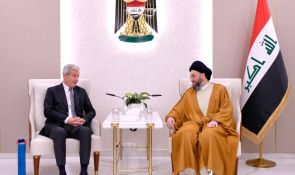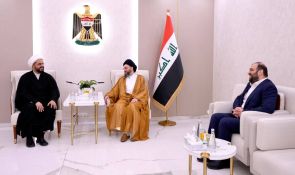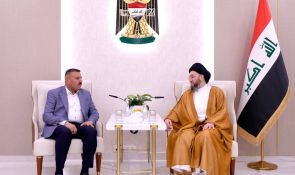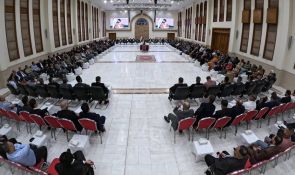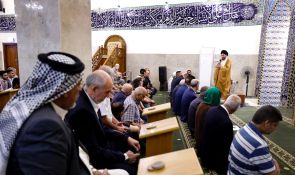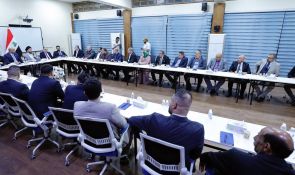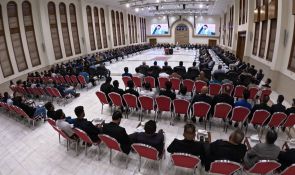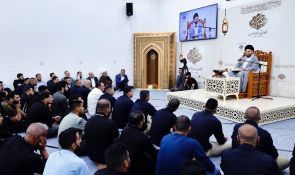In his speech which he delivered at the Conference of Imam and Islamic Awakening, Sayyid Ammar al-Hakim: “The biography of the Commander of the Faithful is not folded by history; it remains alive, casting its effects throughout the movement of history and
Sayyid Ammar al-Hakim, Head of the Islamic Supreme Council of Iraq (ISCI), has stressed that the biography of the Commander of the Faithful Ali, peace with him, is not folded by history as one of dead incidents hiding in the drawers of history. Rather, we emphasize our statement that it is still alive, casting its effects throughout the movement of history and till this day. In his speech at the Conference of the Imam and the Islamic Awakening in Tehran on October 10, 2012, which was delivered on his behalf by Shaikh Hameed Mu`allah al-Saa`idi, explained that t is not right to look at these transformations as mere political movements carrying self objectives of particular groups that carry ambitions to get the power of authority and wealth. He explained that we have to look at it as human transformations that will definitely contribute to finding major transformations in the history of humanity in the future. He pointed out that the first person to identify nations’ movements represent an Islamic awakening was the leader of the Islamic Revolution is His Eminence Grand Ayatollah Sayyid Khamenie (may his shade perpetuate).
Al-Hakim regarded the researches and trends in the subject of Imamate are also lengthy. Such discussion penetrates the depth of the Islamic doctrine just as it penetrates the depth of the political and social effects in the Muslims’ lives. His Eminence stressed that despite the difference among the Muslim jurists and thinkers, they agreed on a group of issues relevant to this important and serious subject. Yet we cannot avoid pointing out to a clear fact which is: There is an agreement on the need for Imamate in its various definitions in the life of the Muslims and for organizing the political and social life.
Below is the text of his speech:
In the Name of Allah, the most Gracious, the most Merciful
Praise belongs to Allah, the Lord of the Worlds, peace and blessings with the Seal of the Prophets and Messengers, Muhammed, with his good and pure Progeny and elite companions.
Peace with you all, Allah’s mercy and blessings
Many are the researches and trends in the subject of Imamate, and they are lengthy, too. It is a discussion that enters the depth of the Islamic creed just as it enters into the depth of the political and social effects in the life of the Muslims.
Muslim jurists and thinkers have differed among themselves, agreeing on a group of issues that are related to this important and serious subject. There is no room here to research in this disagreement and in the agreement as much as time and the nature of this conference allow, but we have no choice except to point out to a clear fact which is: There is an agreement on the need for Imamate in its various definitions in the life of the Muslims and to organizing their political and social life.
From this onset, we do not here discuss the logic subject as much as we discuss the reality subject, although the latter is connected to some degree to the logic subject.
We here try to focus on a group of words which we derive from the biography of the Commander of the Faithful Ali ibn Abu Talib, peace with him, who is the embodiment of one of the testimonials to the consensus of the Muslims that he was the Imam. He was and still is one of the sources of unity in them. From him do we derive the important axes that connect us with our present which we now live in this world which is confused with visions and personal judgments.
1. Principles
They are manifested in advancing the public interest over the personal interest: “By Allah! I shall take to peace so long as the affairs of the Muslims are safe and so long as they have no injustice except to me personally, seeking its reward and advantage.”
We nowadays find the sons of the Islamic Awakening providing sacrifices, persevering as they are harmed for the sake of the upliftment of their nations and the achievement of their rights.
2. Resisting Injustice, Attempting to Firm Justice
Injustice remains to be one of history’s landmarks in the human life since its first formation and till our day. In the life of the Commander of the Faithful, peace with him, there are many practical evidences for his standing against injustice, defending right, diligently trying to achieve justice in the life of the Muslims.
For this, he had to tolerate a great deal of harm, ingratitude, fighting and defamation, but all of this did not prevent him from continuing his straight path, becoming a role model to be emulated in the history of humanity, all of it, and not just in the life and history of the Muslims: “A servile individual is honored with me till I attain for him what rightly belongs to him, and the strong one is with me weak till I take from him what he rightfully owes.”
From here, we can say that the biography of the Commander of the Faithful Ali, peace with him, was never folded by history as dead events and incidents hiding in the drawers of history. Rather, we underscore our statement that they remain alive, casting their effects in the overall movement of history till this day.
From both of these axes, I would like to enter in the slogan of this conference which is: Imamate and Islamic Awakening, a slogan that carries a good deal of precision and difficulty, precision in viewing the programmatic impacts left by the historic events on the future. This future represents an extension for the movement of time which is not stripped of its events. And the difficulty lies in discovering the real and programmatic historic factors, of events and incidents that have been left behind by distant centuries, and their impacts on the lived reality.
We nowadays are living a reality which is no longer obscure to many of those who are interested in the major social transformations in the history of humanity. This matter we all share, I mean coexisting with this reality. But what we see as important now is to discover the nature of this reality, its dimensions, trends and outcomes on the future movement of history.
We now live a reality in which there is much injustice, aggression, marginalization, hostility, the tyranny and arrogance of those who are materially strong. This aggression, and this hostility, has bypassed the small area of individuals and groups to areas of the peoples and nations. There are nations falling under aggression, and there are peoples attempts to enslave and oppress whom are ongoing.
But we also, in contrast, find nations that stand against aggression, against injustice, against the confiscation of liberties and rights.
There are peoples that revolt against their unjust rulers and peoples that demand rights and liberties, demanding the achievement of social justice. All these, in the final description, represent the movement of history, and in no way can there be reliance on a one-side reading of history, on knowing or expecting its future outcomes.
We now this fledgling movement, which at the same time is confident of its victory, is advancing on the field carrying various label. It does not carry the label of direct doctrinal link to Imam Ali, peace with him, nor to the particular Imamate label, but it in essence is connected, in many of its appearances, to that label. Demanding the rights, standing against injustice and aggression, sacrifice for the sake of all of this with lives and wealth, diligent effort for humanity towards firming the foundations of justice… are all important manifestations of the great transformation which we have witnessed since the last quarter of the 20th century and till our time. It is a transformation which cannot be denied, nor can be underestimated.
It is not right to look at these transformations as being mere political movements carrying self objectives for special groups that carry ambitions for gaining the power of authority and wealth. Rather, we have to look at them as human transformations that will imminently contribute to creating major transformations in the history of humanity in the future… The first individual who identified the movement of peoples as an Islamic awakening is the leader of the Islamic Revolution, His Eminence Grand Ayatollah Sayyid Khamenie (may his shade perpetuate).
The Islamic awakening now in various positions, Islamic areas and others, is facing major challenges without any doubt. Among these challenges are the ongoing attempts to link them to the wheel of the interests of governments and states and to turn them from a human movement that works for global objectives and principles that serve all mankind into mere movements that serve narrow political interests of this state or that.
So that the Islamic awakening may continue its prime and momentum, we all have to feed it with sublime principles so these may become the label of its movement and historic action on the ground because without this, it will be nothing but another tool for perpetuating injustice and aggression, the tyranny of the arrogant once and the despots.
We nowadays are facing a historic turning point and major transformations in history. They are serious transformations that bear expectations of more and more escalation among the world’s conflicting forces.
No longer now the conflict in many of our Islamic areas carries loose and attractive labels. Rather, it carries direct and frank labels, and they are the most dangerous on the Islamic awakening, for the sectarian and ethnic labels are now, due to the efforts of the enemies of Islam, the most prominent for the conflict. From here, it is mandatory on us to warn in the strongest terms against being dragged into the conflict under these labels and titles. We also must determine with precision the enemies of Islam, the enemies of the Islamic awakening, and the enemies of the human dignity distantly from the sectarian or ethnic characterizations.
The labels of the conflict now reaching these narrow circles is not the result of the Islamic awakening but is the subjective antithesis of them, and they undoubtedly are the outcome of a big conspiracy that targets the Islamic unity.
We must seek the arbitration of principles and define them as criteria in the stances towards our great, complex and entangled issues.
Labels grant no rights. Rather, right is the one that grants the labels their real value. Our support for what is right, our resistance of injustice and aggression, our respect for man, his rights and dignity, the achievement of human justice, the peaceful coexistence among those who differ, respect for plurality of opinion, for the human and Islamic brotherhood: “They are two types: either your brother in faith or your like in creation,” the unity of the Muslims: These are the criteria behind which the Islamic awakening must rally; they are criteria that were personified in the biography of the Commander of the Faithful, peace with him.
We have lived and continue to live the Iraq experiment, our dear homeland. From the beginning, we wanted to unite all the Iraqis round the principles that unite and do not divide us. We worked hard for this end with all our strength. But the forces of evil and terrorism wanted to drag Iraq into the wars of special labels, and they almost succeeded, had it not been for men of reason and wisdom in Iraq standing in their face, in the vanguard of whom is the supreme religious authority in al-Najaf al-Ashraf. We, Praise is due to Allah, have transcended that phase despite all the wounds, and we now live atmospheres of openness and understanding for each other. This augurs a promising future for a secure and peaceful coexistence among all Iraqis.
We have tried and we still try to see right as being right so we may follow it and falsehood as falsehood so we may avoid it. Such is the line of our march in life. We do not want to be one day assisting an oppressor or hiding behind the same labels which we are honored to bear. And we do not be opponents of any just person even if he does not bear some of our labels. This is what we have learned from our great Prophet, peace and blessings of Allah with him and his progeny, and from our Imam, the Commander of the Faithful, peace with him.
What we want to do in Iraq is to achieve all rights, to stand in the face of injustice, to move the Islamic awakening which the Iraqis are undergoing towards positive outgiving which is represented in the unity of the citizens of this people who learned from al-Hussain, peace with him, the meaning of revolting against injustice and tyranny.
Our support for what is right is the one that grants our issues their sanctity and impact in the sentiments and the good souls.
In conclusion, I would like to offer many thanks and appreciation of everyone who has organized this important conference. I also thank them for granting me the opportunity to participate in it.
I plead to Allah, the most Praised One, the Almighty, to grant success to the works of this conference so it may achieve the lofty goals for which it has been held. I also plead to Him, the most Exalted One, to protect our Islamic nation in the east of the globe and the west; surely He hears, and He answers the pleas.
Peace with you all, the mercy of Allah and His blessings.
Baghdad, Sayyid Ammar al-Hakim, Head of the Islamic Supreme Council of Iraq, October 10, 2012


